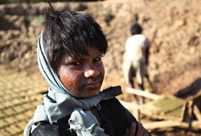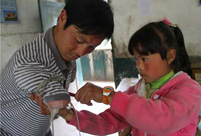BEIJING, Oct. 22 -- A total of 32 ministerial-level officials were investigated for corruption from January 2008 to August of this year, according to a report from the Supreme People's Procuratorate (SPP) released Tuesday.
About 13,300 of the 198,781 people investigated in graft cases during the period were officials at the county level and above, said Cao Jianming, procurator-general of the SPP, when delivering the report on the SPP's work against embezzlement and bribery at the ongoing bi-monthly session of the Standing Committee of the National People's Congress (NPC), China's top legislature.
About 167,000 people were prosecuted under embezzlement and bribery charges while 148,931 were convicted by courts during the period, Cao said.
Among those under investigation, a total of 65,629 civil servants have been investigated for taking bribes while 23,246 people were probed for handing bribes, Cao said.
The number of people convicted for taking bribes from 2008 to 2012 increased by 19.5 percent over the period from 2003 to 2007, while the number of those convicted of handing bribes increased by 60.4 percent, according to Cao's report.
Of 151,000 graft cases investigated in the past five years, about 4,800 cases involved bribes of at least 1 million yuan (161,000 U.S. dollars) or embezzlement of at least 10 million yuan, the report said.
While striking hard against all corruption, anti-corruption agencies have paid special attention to important and vulnerable sectors in the country's economic development, such as land use, property transactions, pharmaceutical sales, government purchases and public infrastructure projects, Cao said.
The agencies also looked into embezzlement and bribery related to food safety, education, social security, health care, poverty reduction and environmental protection, which are areas the public cares about most, he added.
The Chinese leadership considers corruption as one of the most pressing and serious problems that must be solved.
Chinese President Xi Jinping vowed to go after both "tigers" and "flies," or high-ranking and low-level corrupt officials, as well as constrain political power within a "cage of regulations."
Anti-corruption agencies attached to the SPP and its local branches have worked closely with discipline inspection agencies of the CPC and government supervisory agencies, Cao said.
"We have clarified the duties of each agency and worked independently in line with laws but also forged into a joint anti-graft force with better communication and cooperation," he said.
To facilitate information sharing, the SPP set up a database with 14 government ministries and worked with police and customs agencies to pursue suspects on the run, he said, adding that about 6,700 suspects in graft cases have been caught through such joint efforts since 2008.
Efforts were also made to increase tip-off channels and protect informants. The SPP opened a national tip-off hotline and an Internet platform that linked the SPP and its 1,161 local branches.
While working hard to fight corruption, anti-corruption agencies also tried to regulate their investigation procedures.
Since January, anti-corruption agencies have been required to hand over videotapes of interrogations of suspects in graft cases to prosecutors and the court, together with documentary evidence after the investigation is complete, according to the report.
Although progress has been made in investigating corruption, there are a number of challenges in terms of efficiency and methods of investigation, Cao said.
Some local anti-corruption agencies do not have enough manpower and resources, he said.
"Some of our investigators rely too much on confessions rather than evidence," he said.
"There were still cases where the legal rights of parties were seriously violated during graft investigations. A few investigators abused their power," he said.
Anti-corruption agencies also need more professionals in finance, security and computer science to handle increasingly complicated corruption, he said.
 Low wages Indian migrant laborers
Low wages Indian migrant laborers Five fighters in flight training
Five fighters in flight training London mayor hails free trade, subway system on China tour
London mayor hails free trade, subway system on China tour Different eye catching shows at housing fairs in China
Different eye catching shows at housing fairs in China Chalk it up to great courage
Chalk it up to great courage Tibetan girl helps mobilize volunteers onlin
Tibetan girl helps mobilize volunteers onlin Lingerie show dazzles Wuhan Motor Show 2013
Lingerie show dazzles Wuhan Motor Show 2013  Chinese screen goddesses from Beijing Film Academy
Chinese screen goddesses from Beijing Film Academy  Weekly Sports Photos
Weekly Sports Photos Chinese riot police take Liberia peacekeeping mission
Chinese riot police take Liberia peacekeeping mission World has never been dark-- a blind kid’s life in Tibet
World has never been dark-- a blind kid’s life in Tibet Change to law may make it easier to sue polluters
Change to law may make it easier to sue polluters UNESCO world heritage site: Montale Tower
UNESCO world heritage site: Montale Tower U.S. Senate leader announces bipartisan deal
U.S. Senate leader announces bipartisan deal Fiber-optic wedding dress show shinning in Suzhou
Fiber-optic wedding dress show shinning in Suzhou Day|Week|Month